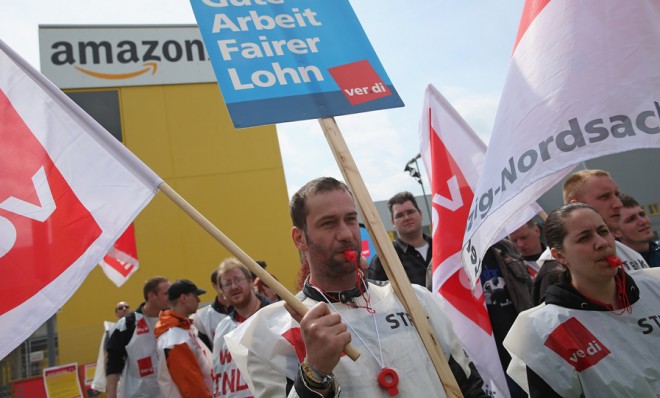Amazon's anti-union strategy hits a snag
The multinational is facing strikes in Europe, where Big Labor has more clout

A free daily email with the biggest news stories of the day – and the best features from TheWeek.com
You are now subscribed
Your newsletter sign-up was successful
Amazon has been at the center of all kinds of labor discussions lately.
President Barack Obama delivered a speech about middle-class job creation last week at an Amazon warehouse, sparking a controversy over the e-retail giant's role behind a proliferation of low-paying, part-time jobs. Meanwhile, Gawker published a series of complaints from former workers detailing less-than-ideal working conditions at Amazon's fulfillment centers, with one proclaiming, "I fucking hate them more than any company."
And most problematically for the company itself, Amazon's workers in Germany have walked out on strike, underscoring the kind of challenges a multinational company faces when it operates in nations where Big Labor holds more sway.
The Week
Escape your echo chamber. Get the facts behind the news, plus analysis from multiple perspectives.

Sign up for The Week's Free Newsletters
From our morning news briefing to a weekly Good News Newsletter, get the best of The Week delivered directly to your inbox.
From our morning news briefing to a weekly Good News Newsletter, get the best of The Week delivered directly to your inbox.
Amazon's German employees are picketing to be reclassified on the national pay scale as retail workers instead of warehouse workers, a change that would earn each worker $12,000 more a year. But it's much more than a wage dispute, says The New York Times. The deeper issue "is Amazon’s opposition to unions in its warehouses as a general principle, because the company fears unions will slow down the kind of behind-the-scenes innovation that has propelled its growth."
As a global powerhouse that employs 100,000 people around the world, Amazon has long opposed unions. Over the last decade it has successfully obstructed workers' efforts to unionize in the United States, even as it has weathered criticism over working conditions and class-action lawsuits about pay. Here's more from the Times:
Dave Clark, the company’s vice president of worldwide operations and customer service, says Amazon views unions as intermediaries that will want to have a say on everything from employee scheduling to changes in processes for handling and packaging orders. Amazon prizes its ability to quickly introduce changes like these into its warehouses to improve the experience of its customers, he said. [The New York Times]
But unions wield a lot more clout in Germany, Amazon's second-largest market, which accounted for 14 percent of its total revenue in 2012. Ver.di, the trade union backing the Amazon strikes, has some 2.3 million members and a "sizable war chest" to pay striking workers.
"Unions there say the company has imported American-style business practices — in particular, an antipathy to organized labor — that stand at odds with European norms," says the Times.
A free daily email with the biggest news stories of the day – and the best features from TheWeek.com
But it's unclear if Amazon will budge, especially since times are changing in Europe as well. Germany's unions have been losing members lately, says The Economist, as union-dominated industries cut back on jobs.
Newer companies, especially in areas such as e-commerce, security firms and fitness studios, are "almost entirely without collective representation," says Martin Behrens at the Hans Böckler Stiftung, a union-linked think-tank.
Workers at any German company with five or more employees can demand the creation of a works council. But in 2011 only 12.5 percent of all companies had one, down from 13.4 percent the year before. [The Economist]
That may be the one of the reasons the walk-outs in Germany haven't so much as nicked Amazon's bottom line. In the cases in which strikers have prevented Amazon from filling an order, Amazon has simply shifted the order to another warehouse.
Carmel Lobello is the business editor at TheWeek.com. Previously, she was an editor at DeathandTaxesMag.com.
-
 Sepsis ‘breakthrough’: the world’s first targeted treatment?
Sepsis ‘breakthrough’: the world’s first targeted treatment?The Explainer New drug could reverse effects of sepsis, rather than trying to treat infection with antibiotics
-
 James Van Der Beek obituary: fresh-faced Dawson’s Creek star
James Van Der Beek obituary: fresh-faced Dawson’s Creek starIn The Spotlight Van Der Beek fronted one of the most successful teen dramas of the 90s – but his Dawson fame proved a double-edged sword
-
 Is Andrew’s arrest the end for the monarchy?
Is Andrew’s arrest the end for the monarchy?Today's Big Question The King has distanced the Royal Family from his disgraced brother but a ‘fit of revolutionary disgust’ could still wipe them out